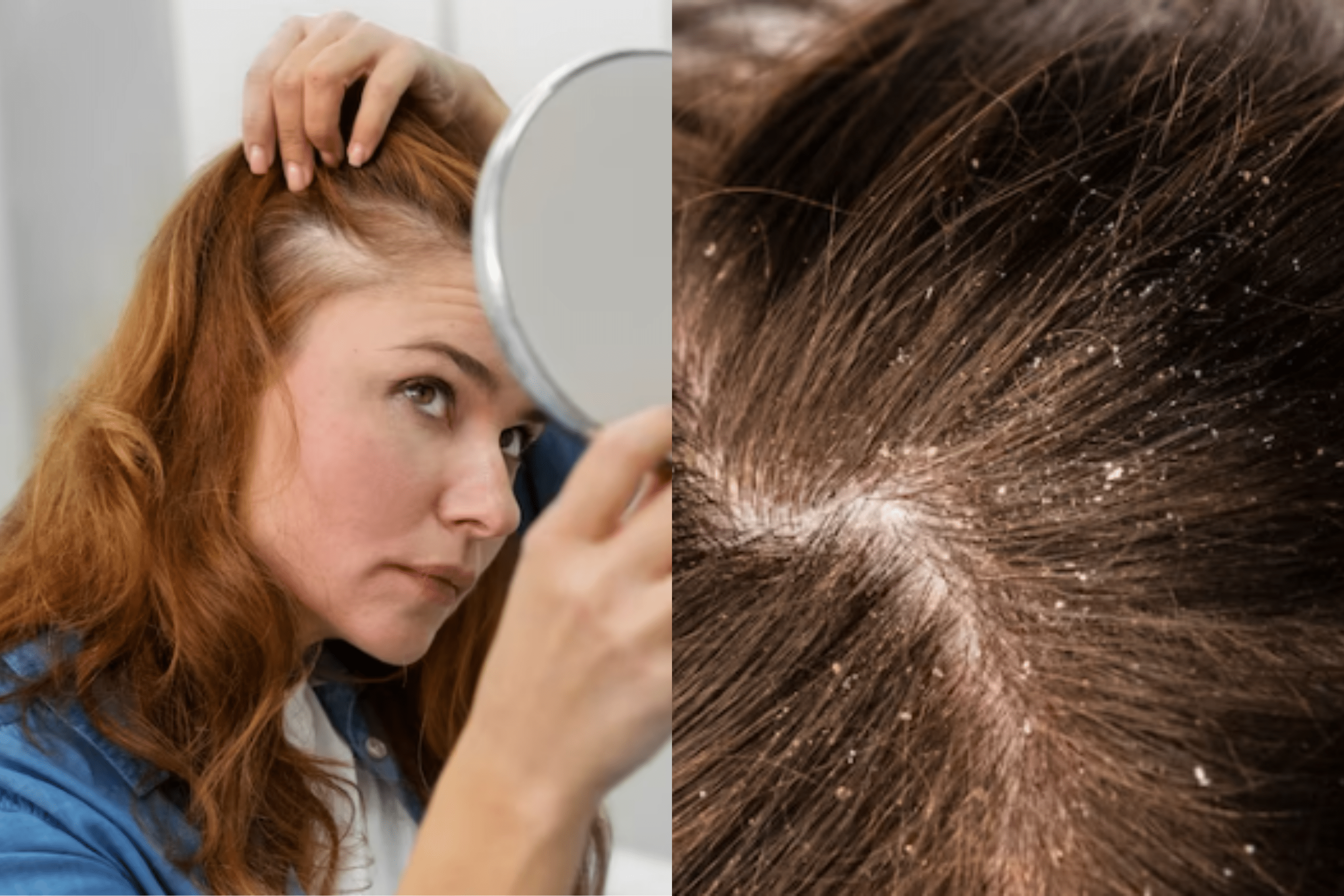When it comes to hair and scalp health, two common causes often cause confusion: Dandruff vs dry scalp. Although these two conditions can have some similar symptoms, understanding their difference is the key to effective treatment and achieving a healthy scalp.
In this article, we’ll explore deep into the world of dandruff and dry scalp, exploring their causes, and symptoms, and providing actionable treatments to help you reclaim your scalp’s goodness.
1. Unraveling Dandruff:
Dandruff, scientifically known as seborrheic dermatitis, is a chronic condition mainly caused by the overgrowth of Malassezia yeast on the scalp.

This yeast triggers an inflammatory response, causing crusting, itching, and burning. Common symptoms of dandruff include persistent itching as well as noticeable white or yellow scales.
2. The Dry Scalp Dilemma:
On the other hand, dry scalp occurs when the natural moisture balance of the scalp is disturbed. This can be due to factors like cold weather, excessive use of harsh hair products and less shampooing.
Symptoms of dry scalp include dryness, small white flakes and sometimes itchiness.
3. Dandruff vs Dry Scalp Causes and Symptoms:
Dandruff vs Dry Scalp can result in flaking and itching, there are distinct differences between the two. Dandruff is characterized by large, oily-looking flakes and is often accompanied by redness.
The flakes of dry scalp are small and have a powdery appearance, plus the scalp feels hard and dry. Understanding these variations helps in the accurate diagnosis of the condition.
4. Effective Ways to Deal with Dandruff:
Medicated shampoos: Look for shampoos that contain active ingredients like zinc pyrithione, ketoconazole, or selenium sulfide. These help control the growth of yeast and reduce inflammation.
Natural solution: The antifungal properties of tea tree oil can fight dandruff. The soothing effects of aloe vera reduce itching and burning. The acidity of apple cider vinegar helps restore the pH balance of the scalp.

5. Overcoming Dry Scalp: Practical Solutions:
Moisturizing products: Choose shampoos and conditioners that provide hydration and restore moisture balance.
Gentle hair care: Avoid harsh hair products and limit heat styling to prevent further dryness.

Scalp massage and oils: Regular scalp massage with natural oils such as coconut oil or jojoba oil can nourish and hydrate the scalp.
6. Preventive measures for a healthy scalp:
Balanced diet and hydration: Proper nutrition and hydration support the overall health of the scalp.

Avoid triggers: Identify and reduce triggers such as stress or certain hair products that worsen your condition.
7. Seeking Professional Guidance:
If your Dandruff vs Dry Scalp persists despite trying over-the-counter remedies, it’s time to consult a dermatologist or health care professional. They can provide personalized recommendations and treatments tailored to your specific needs.
Dandruff vs Dry Scalp Conclusion:
Dandruff vs dry scalp may sound similar, but they require different approaches to treatment. By understanding the underlying causes and symptoms of each condition, you can make informed decisions to nurture a healthy and vibrant scalp.
With the right care and treatment, you’ll be on your way to the beautiful, flake-free hair you desire.
Remember, making your scalp health a priority not only enhances your appearance but also your overall confidence. Embark on the journey towards a revitalized scalp, and say goodbye to the confusion between dandruff and dry scalp forever!
FAQ’s
Q1: What is the difference between dandruff and dry scalp?
Dandruff and dry scalp are two different scalp conditions. Dandruff is characterized by the appearance of white or yellow scales on the scalp and hair, often accompanied by itching. Dry scalp, on the other hand, refers to a lack of moisture on the scalp, which can lead to dryness, flakiness and itchiness.
Q2: Can dandruff and dry scalp be treated at home?
Yes,Dandruff vs Dry Scalp both the conditions can be managed at home. For dandruff, using over-the-counter anti-dandruff shampoos containing ingredients such as pyrithione zinc, ketoconazole, or selenium sulfide may help.
For dry scalp, regular use of a gentle moisturizing shampoo, avoiding hot water and maintaining proper hydration can provide relief.
Q3: What is the cause of dandruff?
Dandruff is mainly caused by the overgrowth of a yeast-like fungus called Malassezia on the scalp. This overgrowth can lead to increased cell turnover and flaking. Other factors such as genetics, hormonal changes and certain skin conditions may contribute to dandruff.
Q4: When should I seek professional help for dandruff or dry scalp?
If over-the-counter treatments are not effective, or if you experience severe itching, redness, swelling, or if the condition worsens, it is recommended to consult a dermatologist or healthcare provider for a proper diagnosis and treatment plan. is recommended.
Q5: Are dandruff and dry scalp contagious?
No, neither Dandruff vs Dry Scalp scalp is contagious. They are conditions of the scalp that result from internal and external factors, not person-to-person contact.
Q6: How can I differentiate between dandruff and dry scalp?
Dandruff usually produces oily and large flakes that may be accompanied by redness and itching. Dry scaly patches are small, white and dry, often with no significant itching or swelling.
Q7: Can dandruff or dry scalp cause hair fall?
Neither Dandruff vs Dry Scalp directly causes hair loss. However, excessive scratching due to itching can potentially damage hair follicles and lead to hair breakage.
Q8: Can diet affect dandruff or dry scalp?
Dandruff vs Dry Scalp -A balanced and healthy diet is important for overall skin health, but the specific dietary factors that directly contribute to dandruff or dry scalp are not well established. Some studies suggest that reducing your intake of sugar and yeast may help some individuals deal with dandruff.
Q9: How can I prevent dandruff or dry scalp?
Dandruff vs Dry Scalp-Maintaining good scalp hygiene, using proper hair products, avoiding excessive heat and harsh chemicals, and staying hydrated can help prevent both dandruff and dry scalp. If dandruff is prone, regular use of anti-dandruff shampoos can also be preventive.
Check More Blogs On- Humanxplorer



